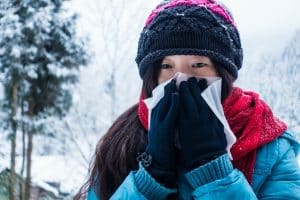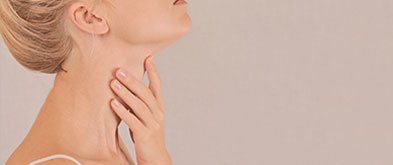What Are the Top Triggers for Winter Allergies?

In this blog, the specialists at Lakeside Allergy ENT will explain the top triggers for winter allergies.
What Are Winter Allergies?
The same irritants that are present year round are also responsible for winter allergies. Some of the main culprits are pet dander, pollen, dust mites and mold. It doesn’t help that when you’re cooped up in a warm house, it’s harder to escape prolonged exposure to these allergens. The tricky thing about diagnosing winter allergies is that the symptoms often mimic the common cold, which can be confusing when you’re trying to treat the underlying cause.
An important thing to remember is that a cold makes you miserable for a few days to a week, and then clears up on its own. Winter allergies, on the other hand, can last for much longer and have a tendency to come and go.
What Triggers Winter Allergies?
Mold and pet dander are the top allergens that cause a host of bothersome symptoms. During the winter, you’re more likely to be stuck indoors in close contact with your pets, which can make symptoms worse.
Wet, decaying leaves and other yard debris make a perfect breeding ground for mold. Spending time in your yard gives mold the opportunity to find its way into your home by clinging to your shoes and clothes. Mold can also hitch a ride inside on damp firewood.
In mild climates like Texas, there are few hard freezes and frosts to kill plant and tree pollen, which is a major allergy trigger. Combine all these allergens in a closed up house with recirculating central heat, and you’re likely to have all the components necessary for an allergy attack.
Other winter allergy triggers include:
- Dust mites – microscopic bugs that live in pillows, mattresses, and other bedding. Their invisible droppings circulate through the air, leading to allergy symptoms.
- Cockroaches – a big allergy and asthma trigger for those who are allergic to their saliva, feces and dried out shells.
What Are the Symptoms of Winter Allergies?
Common winter allergy symptoms include the following:
- Coughing
- Sneezing
- Runny nose
- Red, itchy eyes
- Dark circles under the eyes
The prevalence of colds and flu during the winter makes it harder to determine if you have allergies or a virus. Here are differences to look for when diagnosing your symptoms:
Cold:
- Mucus is thick and yellow
- Lasts three to seven days and then symptoms go away
- Chills and body aches
Allergies:
- Mucus is thin and clear
- Lasts for weeks or more and may come and go
- Itchy eyes and throat
What Are the Treatment Options for Winter Allergies?
Just like with other times of the year, there are many effective ways to prevent and treat your winter allergies.
Preventative measures include:
- Avoiding allergens: Stay indoors on windy days when the wind is stirring up damp, moldy leaves and plant debris. Mop and sweep your floors often.
- Washing out allergens: Before your symptoms get out of hand, make it a habit to regularly wash your pillows and bedding in hot water to rid them of dust mites and pet dander. Wash your hands frequently and take hot showers to wash away allergens. A shower’s steam is a bonus for soothing a stuffy nose.
- Using a saline solution: This simple, non-prescription remedy is gaining ground as an effective tool in eliminating allergy symptoms. Pick up a kit at your pharmacy or make your own solution by adding a teaspoon of salt to a cup of sterile water in a squirt bottle. The gentle irrigation of the nasal passages washes away mucus and allergens and can help you breathe easier.
- Staying hydrated: Drink plenty of water and hot tea to stay hydrated to relieve nasal congestion.
- Taking allergy medications: Reduce your symptoms by taking over-the-counter decongestants, antihistamines, and inhaled corticosteroids to alleviate your symptoms. Follow the directions on the package for safe use.
Where Can I Get a Consultation for Winter Allergies?
At Lakeside Allergy ENT, we offer our patients of all ages state-of-the-art treatments for a wide variety of ear, nose and throat conditions including allergies, sinusitis, hearing loss, and much more. We offer minimally invasive treatments and have extensive expertise in surgical options when appropriate.
With three conveniently located offices in Forney and Rockwall, we strive to deliver compassionate, personalized care to our patients in a caring, comfortable environment. Call us today at 972-771-5443 to make an appointment or visit our website to request an online appointment.






